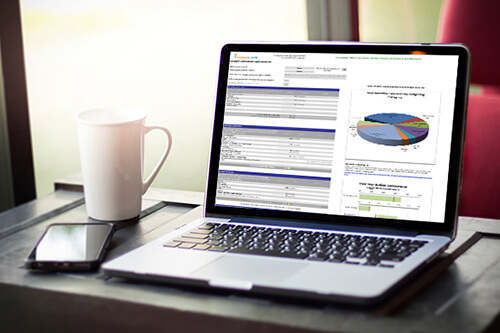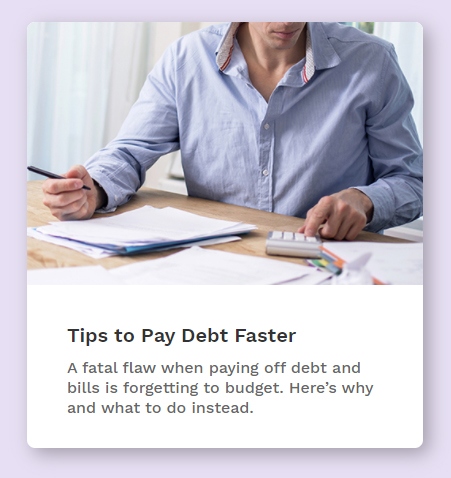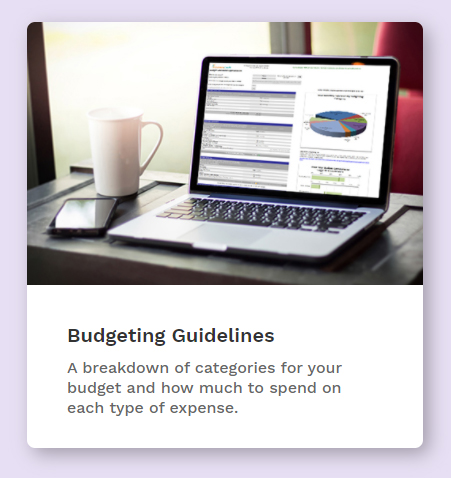Budgeting
Learn what budgeting is and how it can help you.
Budgeting
Your Money Management Cheat Sheet
What comes to mind when you hear the word budgeting? Complicated tools? Endless spreadsheets? A ball and chain? The truth is that a budget is simply a guide for your spending and money management. You could even think of it as a cheat sheet, since it gives you the answers for how you can realistically reach your financial goals. The best budget puts every dollar to use and provides the freedom to prioritize what matters to you. If you’re currently in debt or are having difficulty affording necessary expenses, making or improving your personal budget can help you get back on the right track. Explore this page to learn more about planning a budget and access free resources to help get started.
Basics of Budgeting
The basics of budgeting don’t require you to be a personal finance expert to have a master budget. In fact, there are really only 3 rules for budgeting that you must follow. The first rule is to know what money is coming in (e.g. your household’s after-tax income). The second rule is to know what money is going out (e.g. your daily expenses). The third rule is to make sure that there isn’t more money going out than there is coming in. And that’s it! But we get it – the third rule is the hard one.
Whether you’re a student budgeter worrying about your next semester or the budget mom managing finances for her whole family, these 3 rules are the foundation to building a budget that works. If you wanted to keep things simple, then balancing out your income with your expenses is known as zero based budgeting; in other words, you give every dollar you have a job without spending any dollars you don’t have.
Doing this effectively requires adding up all of your expenses and then making sure that total is equal to your income. If it’s higher than your income, then you’d need to look at either lowering the money going out or raising the money coming in. One important point to remember is that your savings also counts as an expense. It’s a key part of any budget because savings prepares you for future expenses that you may or may not expect.
Why You Need a Budget Breakdown
You need a budget breakdown because it gives you a full overview of how your funds are being used. When changes need to be made, it allows you to make precise adjustments that align with your spending priorities. In other words, a budget breakdown ensures that your hard-earned cash is going exactly where you want it to go.
If you already have a basic budget where your expenses don’t exceed your income, you might be wondering what you should spend less on, or how much you should save. Many people like to follow a 50 30 20 rule where they spend 50% of their money on needs, 30% on wants, and 20% on savings or repaying debt. That is an example of a budget breakdown, but depending on your situation, it might not be a realistic starting point for you right now.
For a more detailed guide about how much money to spend on what, check out our Budgeting Guidelines page. Based on thousands of real budgets, the guidelines organize monthly expenses into categories which are based on an average cost of living analysis.
How to Choose a Budget Planner
Using an established budget planner can make the work of creating a budget easier – as long as it fits your style. There are also many resources out there, but when you know the basics of budgeting, you could make a budget by yourself with just a pen, paper, and calculator. You could use a budget maker framework like zero based budgeting, the 50 30 20 rule, or kakeibo. You could also consider budgeting apps such as YNAB, Mint budget, Goodbudget, and Mvelopes.
If you’re not ready for a full-blown budget, start with a simple, alternative way to budget that keeps your spending below your income. For an in-depth guide that you can download, our 7 Steps to Building a Household Budget is available and completely free. Its step-by-step process with comprehensive budgeting worksheets helps ensure you don’t miss anything important. We also have an interactive, free Excel Budget Spreadsheet that you can download and customize as you like for your personal budget. It can be used as a budgeting template, it has a budgeting calculator built in to do the math for you, and it provides helpful suggestions and guidance along the way. If you’re a post-secondary student, there’s even a special version for you: the Intelligent Canadian Student Budget Calculator. Our Excel Budget Planner was so popular that it’s the basis of the online budget planner the Government of Canada created.
Any of the budgeting tools above could help you; it’s also possible that none of them will. When choosing a budget planner, examine the pros and cons of each option and focus on the ones that cover what’s most important to you. Don’t be afraid to experiment and try different budget management styles until you figure out what works best for your budget. If you’d like to get more interactive or one-on-one support with making a budget, consider joining one of our free webinars for budgeting tips or giving us a call at 1-888-527-8999.
Spending According to Your Budget
Spending According to Your Budget
For many Canadians, making a budget is the easy part – it’s spending according to the budget you created that’s the hard part. In the beginning, it can feel exhausting and even suffocating to stress over your budget every time you’re out shopping. But keep in mind that it can take a few months to finally come up with your best budget. Once you get used to it, budgets actually take away financial stress.
When you know exactly how much you have to spend when shopping for groceries and everything else, you don’t need to worry about accidentally overspending. Furthermore, spending to your budget now helps avoid costly and highly stressful debt later. Remember that the budget you make is your spending guide and works in your best interest. Just as a shopping list tells you what not to buy, it also tells you what you should buy. Your budget helps ensure that everything you truly need is taken care of.
Understanding Needs vs. Wants
Figuring out needs vs. wants can be a challenge. When you’re out shopping and see something you really like, but that isn’t included in your budget, do you cross-reference your budget list on the spot to analyze whether this item can fit into your household expenses? Neither do we. What we can do is ask ourselves a simple question: do we need this item, or do we just want it? If the line is still blurred for you, ask yourself what will happen if you don’t buy the item. If you need it, then it must fit into your budget. If you only want it, then everything that you need must come first. Asking yourself these questions whenever you’re not sure about buying something is important, whether you’re in the store, searching online, or working on your expense sheet. When budgeting for new clothes, for example, a good jacket for winter might be something you need, whereas the season’s trendy shirts could be fun items to purchase if there’s money left over. Understanding the difference between your needs and wants will help keep your budget healthy and avoid shopping trips you’ll regret.
Budgeting Through Hard Financial Times
Hard financial times often come when we least expect them. Debt can get out of hand, jobs can be lost or furloughed, and unexpected bills can overwhelm even the most careful planning. In times like these, a budget is one tool you need to get back on track. It will help you make every dollar count towards stabilizing your present situation and setting the wheels in motion to improve things for the future.
When you need an emergency budget, carefully review your daily, monthly, and yearly expenses. Temporarily cut out all unnecessary spending from your budget; if you have low or no income, you’ll have to cut even deeper to just the bare essentials. But keep in mind that you can’t pay off debt when you don’t have any money. Next, look at what else you can do to improve your situation. This may include finding a new job, downsizing your home, or just sticking to your budget to pay off debt. Remember to keep a small emergency fund, but otherwise focus on paying off anything you owe with an effective debt repayment strategy.
While it may feel tempting to borrow some money now to help ease the burden, that will likely end up making things much worse. If you’re struggling with debt, prioritize getting rid of it without creating any new debt. Many debt help options exist in Canada. While there is no one best option that works for everyone, there will be a best option that works for your situation. Get professional help with finding the best solution for you by calling 1-888-527-8999.
Financial Education for Kids
It’s never too early for your children to start getting a financial education. Of course, this doesn’t mean that you should ask a 6-year-old to research websites for budgeting or get a teen to manage the family expenses. Encourage them instead to take small steps in money management so that they’ll eventually be financially literate and can look after their own financial success.
If they’re young, you can help your kids learn budgeting by letting them make some spending choices under your supervision. This could be as simple as having them choose what snacks to buy on your next grocery run. If you give them an allowance and they want to buy something more expensive, instead of just gifting them the difference, have them save up that allowance until they can afford it without extra help. Exercises like these will help your kids build up good saving and budgeting habits in a safe and controlled environment.
Help Teens Learn Budgeting and How to Manage Money
Teenagers also benefit from learning budgeting in a safe environment. However, don’t be afraid to let them make more important financial decisions by themselves. Resist stopping them if you can foresee a potential mistake. There’s no better teacher than personal experience. Making mistakes when the stakes are smaller and you can still support them is far better than making big financial mistakes that could get them into big debt as adults. Here are some teen money management tips that they should learn now. Knowing these basics about budgeting, banking, and credit will help prepare them for the transition to post-secondary budgeting or working in their adult lives.
Get Budgeting Help
If you’re struggling with budgeting or debt and are wondering how to move forward, give us a call. We’re happy to answer your questions and help in any way we can. It’s possible that all you need at the present time is the right information or a plan for how to move forward once your situation improves. Give us a call if you have any questions. Speaking with us is always free, confidential, and non-judgmental.
Related Topics

Tips to Pay Debt Faster
A fatal flaw when paying off debt and bills is forgetting to budget. Here’s why and what to do instead.

Budgeting Guidelines
A breakdown of categories for your budget and how much to spend on each type of expense.

Credit Counselling
Are you curious about what credit counselling is or how it works? Here’s what you need to know.






